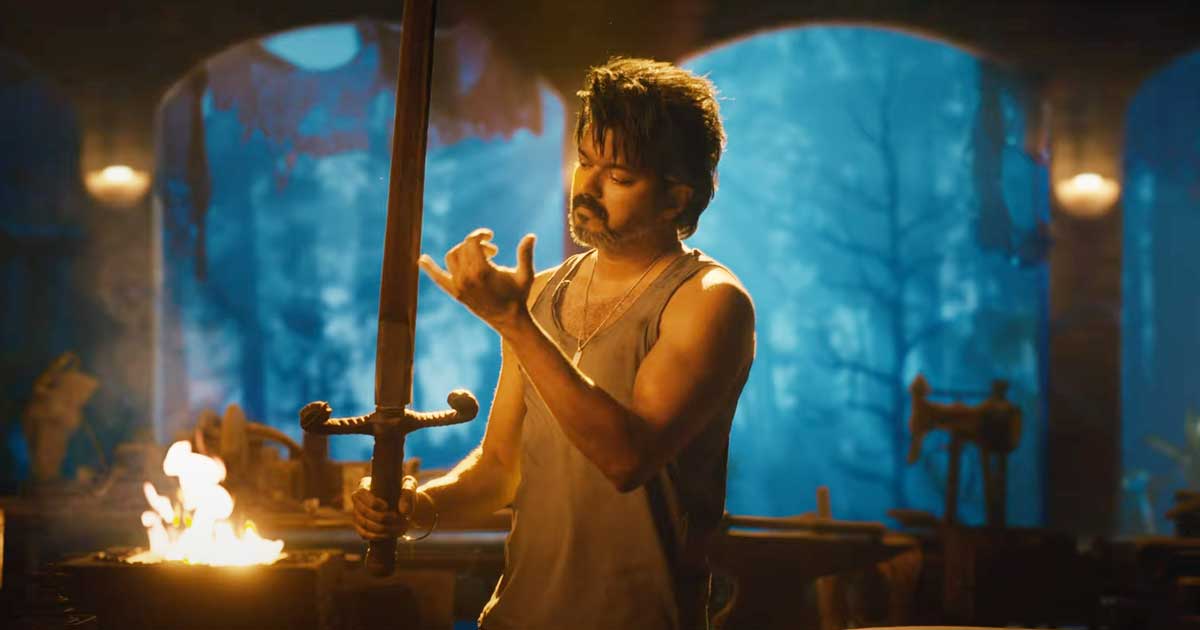Tamil Movie Review: Leo is an exhilarating action-crime-mystery, even in spite of a second half that doesn’t fully deliver

If you had asked me one year ago to compile a list of 100 American movies made in the last twenty years that would make good candidates to be reimagined by Tamil filmmakers, I doubt I ever would have come up with David Cronenberg’s A History of Violence. And yet, as envisioned by Lokesh Kanagaraj – in the third chapter of his larger “LCU” or “Lokesh Cinematic Universe,” no less – the inspiration feels entirely logical and natural. In fact, if there’s a quibble to be had with Leo, it’s that it feels a little too safe and familiar for a Kollywood smash-hit, not that its imagination is too large. For a movie that actively announces itself as a “tribute” to A History of Violence in its opening titles, Leo never really tries to mimic Cronenberg’s penchant for psychological boundary-pushing.
While the adaptation choice may strike some as peculiar given the film’s more modest ambitions, Leo does successfully take the basic setup of A History of Violence and mold it to fit a traditional Kollywood crime saga fronted by a protagonist with a suspicious past. Like Viggo Mortensen’s Tom Stall before him, Vijay’s Parthiban here becomes an accidental local celebrity in his small town after he successfully defends himself, his daughter, and his staff by gunning down a group of homicidal maniacs robbing his café after-hours. The attention proves entirely unwanted, however, when he becomes a target as a result. And the men who want him dead are not just those linked to the ones he killed. There is another, much larger, much scarier group who spot Parthiban in the news and feel confident they’ve finally found an ex-associate they’ve long been searching for named Leo Das. Given Parthiban’s stunning marksmanship during the self-defense incident, we have a feeling they might be right, despite his vehement denials.
In much the same way that Nelson’s Jailer perfectly leveraged Rajinikanth’s star persona earlier this year, Leo feels optimally tailored to Vijay, in his second collaboration with director Kanagaraj (following 2021’s Master). The role of Parthiban – or should I call him Leo Das? – channels Vijay’s screen charisma and beneath-the-surface vulnerability in all the right ways. When we first meet Parthiban, he is working to trap a violent hyena on the loose near an elementary school (yes, in addition to being a café owner, he is a wild animal rescuer). The sequence, which leans into Vijay’s commanding performance from the get-go, gives us an immediate sense that this is a man with a long history of working to control chaos and mitigate disaster. Throughout the film, we’re drawn into his character because we just know he has a complicated past – whether it’s that of Leo Das, or of someone else. But at the same time, he is incredibly likable and principled, and he shows real tenderness with his family. Vijay has both the larger-than-life movie star qualities and the capability to convey unspoken nuance required to pull this dichotomy off.
The action sequences – one of the main drivers of the film’s appeal – are all pretty good, albeit not reaching the same unforgettable heights as the best set-pieces in the highest-grossing Indian blockbusters of the year to date, Shah Rukh Khan’s Jawan and Pathaan. In fact, somewhat humorously, I think the aforementioned hyena rescue might be my favorite action scene in the entire film, as it struck me as being more unique and memorable than the gunfire-laden ones later on. But rest assured, when the weapons do come out – not just guns, but plenty of knives and scythes as well – the spectacle is still impressive. It’s just not necessarily anything we haven’t seen before. That said, director Kanagaraj has a more artistic, painterly sense of aesthetics than many of his peers in Kollywood; the film is always a treat to look at, even when the type of action taking place can feel a little derivative.
My other favorite part of Leo is the music. What an incredible year this has been for Anirudh, who composed the score and songs not only in this film, but also Jailer and Jawan. There is good reason for this: Anirudh consistently produces exhilarating scores that keep the audience invested in the suspense and tension throughout, and he has an uncanny ability to deliver earworms that will get stuck in every viewer’s head for weeks after seeing a movie. I’m listening to the Leo single “Badass” on repeat as I type this; it somehow manages to have an even catchier refrain than the theme from Jawan. If I had to give an award for “Best Body of Work” to any film artist/technician working across multiple titles in 2023, it would go to Anirudh. On a related note, the film’s sole musical number – the warehouse-set “Naa Ready” – is one of the most memorably choreographed in some time, with propulsive and engrossing background dancing.
Where Leo unfortunately falls short is in its story development, especially in the second half. It feels entirely too straightforward and lacking the kinds of big twists needed to capitalize on the strong momentum going into the interval. The obligatory flashback backstory that finally shows us the history of the real Leo is not nearly unique or complex enough to connect to the present in a truly compelling way. Certain pulpy revelations, especially those about human sacrifices, feel a little too absurd for what is actually a pretty emotionally-grounded story; this is A History of Violence by way of Quentin Tarantino at his most over-the-top. It becomes apparent that Kanagaraj and co-writers Rathna Kumar and Deeraj Vaidy did not start with a substantive character history for Leo; they almost certainly worked backwards, in the same order as the film. The haphazard reveals suggest this was simply the best backstory they could come up with to tie into the more engaging narrative in the present.
Some may leave Leo feeling disappointed that the film does not fully “stick the landing” and deliver on its early potential, but there’s simply too much good stuff here for me to not recommend it overall. Vijay is so watchable in this role, the mystery behind his character makes for an entirely engrossing first half, the action set-pieces are often exhilarating, and Anirudh’s score is one of the best of the year (even though it may not even be the best of those he personally composed!). As one might expect, there is a tease at the very end that hints Vijay’s character will be back in future installment(s) of the Lokesh Cinematic Universe, and I for one cannot wait to see him again.

